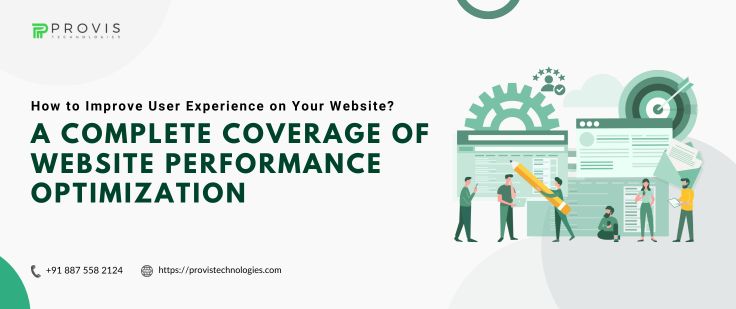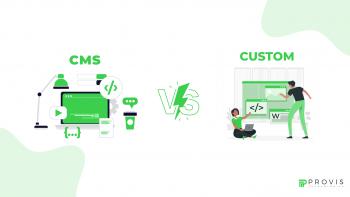Have you ever heard the saying – Customer is God? Well, you must have & if you are in the business, you know why it is. Don’t you? When we talk about websites, the visitor is the customer. You must ensure the visitor has a good time on your website – it is good for business. If otherwise – no, otherwise is not an option. You must understand and learn how to optimize the performance of your website to provide a better user experience. Today, we will cover every aspect of website performance optimization and ensure once you are done reading, you will be ready to fetch as much traffic as possible on your site.
Intro to Website Optimization
In this dynamic & fast-moving environment, a high-performing website is crucial for success. Website optimization is not some technical buzzword – but it’s a strategic approach that can significantly impact user experience, search engine visibility, and everything else. Let’s explore the fundamentals of website optimization and why it’s essential for anyone seeking to serve a great user experience.
Understanding Website Optimization
In simple words, website optimization is making your website function more efficiently to deliver the best possible experience to the visitors. This encompasses various aspects – from enhancing page loading speed & mobile responsiveness to refining the user interface (UI) & implementing SEO best practices. The goal is to make your website smooth, user-friendly, and flawless so that it can meet user expectations & search engine requirements.
The Need for Speed
In an era where attention spans are shorter than ever, users expect websites to load quickly. Slow-loading pages frustrate visitors and lead to higher bounce rates and a decline in search engine rankings. Optimizing images, leveraging browser caching, and minimizing HTTP requests are reliable techniques to enhance page speed and create a more enjoyable browsing environment.
Mobile-Friendliness is Non-Negotiable
Since smartphones use more internet than desktops now – Google’s mobile-first indexing prioritizes mobile-friendly websites in search results, making website responsiveness essential for SEO. Responsive web design adapts to various screen sizes and is necessary for a consistent & engaging user experience.
Strategic Content Delivery with CDNs
Content Delivery Networks (CDNs) consist of a network of servers strategically distributed worldwide, allowing them to deliver web content to users from the server closest to their location. By reducing latency & accelerating content delivery, CDNs contribute to faster loading times and improved overall performance. Integrating a CDN into your website architecture is a strategic move to enhance user experience for global users.
SEO – Beyond Keywords
Without SEO, a website is no longer alive. While keywords are essential, modern SEO involves an extensive approach. Optimizing page titles, meta descriptions, and header tags, improving site navigation, and ensuring a secure HTTPS connection are all critical components. Google’s algorithms prioritize user experience, so a well-optimized website ranks higher in search engine results than others.
Continuous Monitoring & Iteration
Regularly analyzing website performance using tools like Google Analytics helps identify areas for improvement. Whether it’s refining code for efficiency, updating content for relevance, or addressing user experience issues – a proactive approach to optimization ensures that a website remains competitive & adaptive to changing trends & technologies.
Don’t Miss:- Website Performance Metrics Monitoring & Improving User Experience
Benefits of Website Performance Optimization
After knowing website optimization, you can only have one thing in your mind – are these efforts worthwhile? No? Let’s look at the encouraging benefits that might answer your question.
Enhanced User Experience
Website performance optimization is synonymous with a faster, smoother, & flawless user experience. Users appreciate websites that load quickly and navigate smoothly. By reducing page load times, optimizing images, and streamlining code – you create an environment where users can effortlessly access information, leading to increased engagement and a positive perception of your brand.
Improved Search Engine Rankings
Google prioritizes websites that provide excellent user experiences. Page speed & mobile-friendliness are primary factors in search engine algorithms. By optimizing your website, you cater to user preferences and signal to search engines that your site is well-maintained & user-friendly, enabling chances for your site to rank higher.
Reduced Bounce Rates
Slow-loading websites have higher bounce rates because nobody likes dragging in this fast-moving world. Website performance optimization directly addresses this issue, reducing bounce rates and increasing the likelihood of visitors exploring multiple pages on your site. A lower bounce rate helps improve user satisfaction and search engine rankings.
Increased Conversion Rates
Optimizing your website’s performance can lead to higher conversion rates. Whether you want to drive sales, capture leads, or encourage specific actions – a fast & efficient website contributes to a smoother user journey. When users can easily navigate, find what they’re looking for, and complete desired actions without delays – they prefer to order.
Cost-Efficiency
A well-optimized website is often more cost-effective to maintain. By streamlining code, optimizing images, and leveraging caching mechanisms – you can reduce server load & bandwidth consumption. This contributes to a faster website and lowers hosting costs. Additionally, decreased bounce rates and increased user engagement can lead to a higher return on investment (ROI) for your digital marketing efforts.
Must Know:- How to Perform a Website Health Check – A Step-by-Step Guide
Factors Affecting Website Performance
Let’s see the potential factors that can severely affect your website’s performance and what you can do about them.
Hosting Infrastructure
The choice of hosting matters in website performance. Shared hosting, dedicated servers, and cloud hosting each offer different resources & performance capabilities. Opting for a hosting solution that aligns with your website’s needs is essential for ensuring consistent speed & reliability.
Page Size & Content
The size & complexity of your web pages significantly influences loading times. Large images, excessive multimedia content, and intricate code can slow page loading. Optimizing images, compressing files, and minifying code are effective strategies to reduce page size and improve performance.
Code Efficiency
Well-optimized clean code contributes to faster website performance. Bloated or inefficient code promotes load times. Regular code audits, minification, and elimination of unnecessary elements ensure that your website’s code is streamlined for optimal performance.
Browser Compatibility
Websites must be compatible with various browsers and devices to ensure a consistent user experience. Cross-browser testing helps identify compatibility issues that might affect performance, allowing for timely resolution and a seamless user experience.
Network Latency
The physical distance between a user and the hosting server influences network latency. CDNs can mitigate this by distributing content across multiple servers globally, reducing the time it takes for users to access your website.
Also Read:- Unlocking the Secrets 5 Website Maintenance Hacks Every Business Owner Should Know!
Bottom Line
Prioritizing website performance optimization is not just about technical enhancements – it’s about delivering a smooth and enjoyable user experience. A fast, mobile-friendly, and well-optimized website satisfies your visitors and impacts your search engine rankings & conversion rates. By implementing the strategies outlined in this guide, you can ensure that your website remains competitive in the digital space while providing an exceptional user experience.
FAQs
Why does website performance matter for user experience?
Website performance directly impacts how quickly users can access and interact with your content. A faster website enhances user satisfaction and encourages visitors to conduct business.
What are some common factors that affect website performance?
Factors like page load time, server response time, image size, code efficiency, and browser caching can all influence website performance.
How can I measure the performance of my website?
You can use tools like Google Page Speed Insights, GTmetrix, or Pingdom to analyze your website’s performance, including speed, page size, and recommendations for improvement.
What are some quick fixes to improve website speed?
This includes the following:
- Image Optimization
- Minifying CSS & JavaScript files
- Enabling Browser Caching
- Reducing Server Response Time
- Utilizing CDNs
Why is mobile optimization crucial for user experience?
Mobile optimization ensures that your website displays and functions well on smartphones and tablets, catering to the growing number of mobile users.
How often should I review and optimize my website for performance?
Regularly review your website’s performance metrics and make optimizations as needed. Aim to conduct performance audits at least quarterly or whenever significant updates are made to your website.
Are there any agencies that can do this optimization thing for me?
Yes! Top IT agencies like Provis Technologies are well-known for their web development & website maintenance & optimization services. You can connect with them via their website to discuss your requirements.
Written By
Author's Picks
- Edge Computing and Its Impact on Web Performance
- 06/10/2024
- Mobile Optimization: Ensuring Speed on Every Device
- 09/02/2024
- 40+ Website Ideas for Startup Businesses
- 22/10/2024
Categories
- AI for Startups
- AI in Web Development
- AI Integration
- AI Platforms
- AI Prompt
- AI Tools
- AI Trading Software
- Android App
- Android vs iOS Development
- Angular
- API
- API Development
- App
- app development
- App Idea
- App User Feedback
- Application
- Artificial Intelligence
- Audit Services
- Automotive Industry
- Awards and Recognition
- Business Consulting
- Business Website
- Chatbots
- CRM
- CRM for Financial Advisors
- Custom CRM
- Custom SaaS
- Custom Website
- Customer Service
- dashboard design
- Developing a Mobile App
- Digital Business
- E-commerce
- EMR Integration
- Finance
- Financial Advisors
- Financial Advisors
- GIT
- Health Insurance
- iOS App
- iOS App Development
- IoT Mobile App Development
- IoT Platforms
- IT Audit Services
- IT Consulting
- IT Strategies
- Java Development
- Laravel
- Lean Canvas
- Learning Management System
- Logistics Apps
- Mobile App Development
- MVP
- Native App
- News Aggregator Site
- OTT
- Outsourcing IT
- Payment Gateway
- predictive analysis
- Product Launch Strategy
- Progressive Web App (PWA)
- Prototype
- Recommender Systems
- Ruby
- SaaS
- SaaS Application
- SaaS Business
- SaaS Company
- SaaS Development
- SaaS Product
- SaaS Project
- Sales Funnel
- SEO
- Shopping Cart
- Software Development
- SSL and TLS
- Startup Checklist
- Technology
- Tetradic Color Scheme
- UI/UX Design Company
- Unit Testing
- User Flow
- User Testing
- Web Development
- Web Performance Optimization
- website Maintenance Services
- Website Migration Service
- Website Speed Optimization
- WooCommerce
- WordPress





